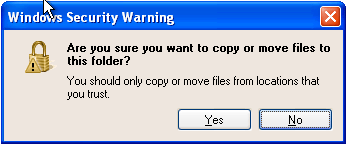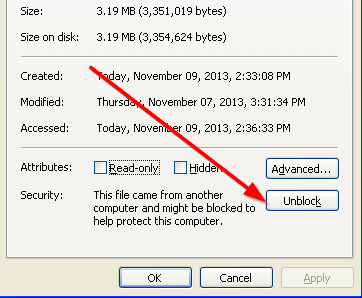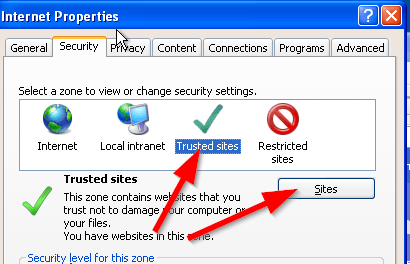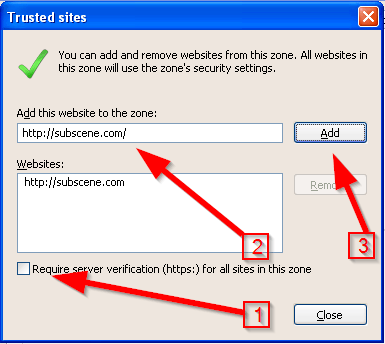3
1
I recently reformatted my hard drive and reinstalled Windows XP (I know I'll have to take the plunge and commit to Win8 "real soon, now", but I'm just not quite ready for the upheaval yet! :)
I used to use WinRar (and later, when I got fed up with the "nag" messages, 7-Zip), but I haven't installed either of them in my new configuration, so I must be using the built-in XP facility when I open *.zip files.
For years, I've been opening downloaded *.zip archives, and using "drag & drop" to copy to a File Explorer window open on the folder where I want the files to end up (usually, My Documents\Downloads).
But now I find that when I "drop" the file(s), I get a pop-up Windows Security Warning saying
Are you sure you want to copy or move files to this folder?
You should only move or copy files from locations that you trust
Can anyone explain why I'm getting this message, and is there any (reasonably easy, please! :) way to suppress it? Since I've already put the *.zip file on my computer, it seems a bit late to ask if I trust it.
(Thus far, the files in question have always been plain text, so it's not a matter of dodgy programs, etc.)
Apologies for the low quality image - I don't have the appropriate tools or knowledge to do any better, and it doesn't help that my "PrtScr" screen capture has included what would have been on my second monitor (TV) if it had been turned on. If you can't read it, trust me - I have copied the text verbatim.





Is that the real message? It seems as though Windows recorded that that file came from the Web, and he flags differently, although I NEVER saw anything like it in all my experience with XP. Can you post a screenshot? – Doktoro Reichard – 2013-11-09T01:03:07.153
It's a bit messy because I still don't have many of the "utility" routines I used to use for capturing screenshots, etc. But I'll try to post something as an "answer" to avoid messing up my question text... – FumbleFingers – 2013-11-09T01:13:24.653
After probing a little I found this. Maybe it is because of some settings in IE that are higher that what is usual.
– Doktoro Reichard – 2013-11-09T01:16:15.817@Doktoro: One of the few things I have downloaded is Google Chrome. I have to have IE because Windows Update refuses to use Chrome, but that's the only thing I normally use IE for. Windows File Explorer (which is what's involved here) doesn't seem to have any configurable security options. – FumbleFingers – 2013-11-09T01:23:45.473
You have to use IE in XP (and in later versions of Windows to a lesser extent) because it is ingrained with normal functions of Windows XP. If you tried to completely remove it, all sorts of nasty would happen. Anyway, IE does store some settings regarding file protocols, I'm testing to see if my hypothesis is valid. – Doktoro Reichard – 2013-11-09T01:26:55.743
I'm not writing an answer (yet) because I have yet to replicate the situation, but I do believe the problem lies with the Security settings in IE. Why do I say this? I locked a site in IE (as unsafe), Firefox prevented me from downloading a file. This indicates IE has an intimate relationship with regular Explorer. – Doktoro Reichard – 2013-11-09T01:35:52.077
As I don't have an English version of IE I can't say for sure, but on "Local Intranet" personalized level settings search for something by the approximate name of "drag and drop or copying and pasting files" and set that option to Allow – Doktoro Reichard – 2013-11-09T01:37:48.147
If you look at the properties of this
– Rik – 2013-11-09T13:39:00.270.zip-file (right-click and choose properties) do you see anUnblock-option? If so, then this is a file downloaded from the internet and its content is only trusted if you unblock it. (See image)@Rik: That's it! I'd need to think about it a bit before deciding whether I want to unilaterally disable the feature for all downloaded files (assuming that's even possible). But now I understand what's going on, it doesn't bother me so much. So although my actual question title asks about disabling, it turns out I'm pretty much satisfied with being given an explanation. If you'd post that comment as an answer, I'd be happy to accept it. – FumbleFingers – 2013-11-09T17:32:02.590
1@FumbleFingers I added an answer. In my answer i also showed how you could circumvent the block for trusted sites you visit often. That way you don't have to completely disable the functionality and still not have the message for trusted files from those sites. – Rik – 2013-11-09T18:51:38.617